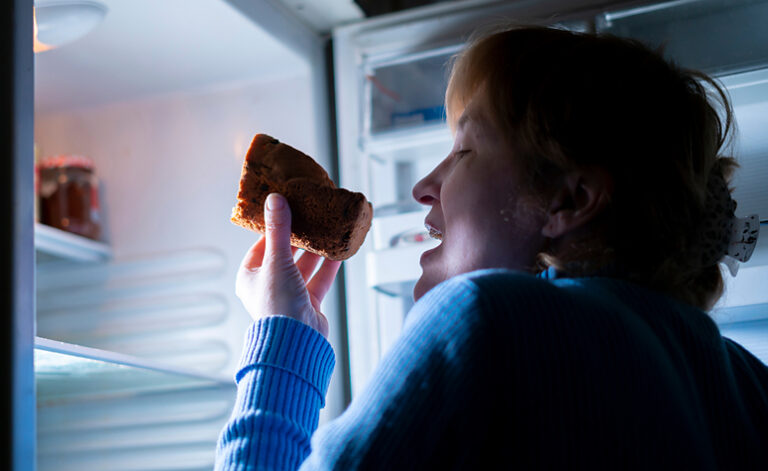Binge Eating Disorder (BED) Treatment
Binge eating disorder (BED) can be a difficult and isolating experience. It is a condition that affects many people across the UK. Let’s take a closer look at BED – what it is, signs and symptoms to watch out for, and the treatment methods available. From private rehab treatment to the possible use of medication, we can help you work your way towards recovery and a brighter future.

What is binge eating disorder (BED)?
Binge eating disorder or “compulsive eating disorder”, is a condition that afflicts many people and is now widely recognised as an eating disorder. BED is the unhealthy practice of indulging in binge eating on a regular basis. Binge eating is when someone eats an excessively large amount of food in one sitting, regardless of whether they’re hungry or not. During a bingeing episode, people with BED lose control and go on a feeding frenzy, consuming food compulsively.
People with BED do not engage in purging behaviours like forcing themselves to vomit or over-exercising as people with anorexia nervosa or bulimia nervosa do, thus their frequent overconsumption of food often results in obesity and other related health complications.
Another factor that distinguishes BED from anorexia, bulimia, and other eating disorders, is that binge eating is more commonly linked to depression and an inability to manage emotions. In contrast, anorexia and bulimia are more commonly associated with feelings of anxiety and an inability to control one’s thoughts.
It is estimated that binge eating disorder affects around 1.5% of the UK population. BED typically impact both men and women equally, and research suggests that it is more common in adults in the 20 – 40 age range. Nevertheless, it is important to be aware that anyone can develop this eating disorder no matter their age, gender, or background. More detailed information on the prevalence and statistics of binge eating disorder is available on our eating disorder statistics page.
Binge eating disorder can adversely affect an individual’s physical health and emotional well-being. Being aware of the gravity of this condition is a crucial initial step in seeking treatment and support.

Symptoms of binge eating disorder
If you suspect you or a loved one might be suffering from BED, it is important to be aware of the following signs and symptoms:
Physical symptoms
- Binge eating even when you’re not hungry
- Eating until you feel uncomfortably full
- Eating excessive amounts of junk food such as crisps and chocolate
- Abnormal eating habits, fasting all day and then binge eating at night
- Eating in private due to embarrassment
- Being physically unfit and overall ill health due to your diet
- Unhealthy skin due to lack of nutrients
Psychological symptoms
- Feelings of guilt and disgust after binge eating
- Anxiety and depression
- Social withdrawal
- Obsessive thoughts about food
- Secretive behaviour
Potential medical complications
- Diabetes
- Morbid obesity
- High blood pressure
- Heart disease


Fast Access to Residential Treatment
We are currently able to offer fast access to private inpatient treatment.
Please call us today and speak to one of our expert advisors.
Call in confidence: 0800 0148 970
Treatment for binge eating disorder
There’s encouraging news however – if you are struggling with BED, you don’t have go through it alone. There’s specialist medical support available that can assist you in regaining control over your eating habits, dealing with underlying causes, and moving forward to recovery.
Inpatient and outpatient treatment for binge eating disorder
If your binge eating disorder is so serious that it is interfering with your daily life, it might be beneficial to have an inpatient eating disorder treatment. This requires you to stay at a specialist treatment centre on a residential basis so you can be given intensive support. Inpatient treatment for BED includes 24-hour support, structured meal plans, comprehensive therapy and a supportive environment.
If you have a milder form of BED, outpatient treatment may suit you better. This might be in the form of day care where you go to a treatment centre for eating disorder therapy which may be for a couple of full days or half days weekly. Or it might include weekly therapy sessions. Whichever it might be, outpatient treatment does not require any hospital stay which means you can go on with your normal daily activities and routines and still receive the constant support that you need.

Therapy types for binge eating disorder
Talking therapy is one of the most beneficial methods used in treating eating disorders like BED. The three talking therapies listed below can be used in inpatient and outpatient settings. The choice of which ones to use will be based on your individual needs and the severity of your binge eating disorder.
- Cognitive behavioural therapy for anorexia nervosa (CBT-E)
This is recognised as one of the most effective therapies for BED. It helps change unhealthy thoughts, feelings, and behaviours associated with binge eating and replaces them with healthy and positive ones.
- Dialectical behaviour therapy (DBT)
Another type of therapy that can be a very effective treatment for BED. It involves the learning of mindfulness, emotion regulation, and distress tolerance skills, which you will find helpful in managing the emotional aspect of binge eating.
- Interpersonal therapy (IPT)
IPT involves dealing with the interpersonal issues that might be influencing your BED. This therapy will teach you how to enhance your relationship and communication skills, which in turn can help minimise any emotional triggers for your binge eating.
- Family-based treatment (FBT)
For young people, family-based treatment (FBT) has proved to be a highly effective form of treatment for binge eating disorder. FBT involves family members in the therapy process, which aims to help a young individual with binge eating achieve a healthy weight and eating pattern.
Medication for binge eating disorder
In certain cases, mental health professionals might find it necessary to prescribe medication to help manage BED. A selective serotonin reuptake inhibitor (SSRI), known as sertraline, is one medication that can be especially helpful for people with BED.
Although the use of medicines is not the primary treatment method for binge eating disorder, it can be beneficial in several ways, and these include the following:
- Regulating serotonin levels – SSRIs, including sertraline, increase levels of serotonin in the brain. Serotonin is a neurotransmitter that contributes to mood regulation and appetite control. There are some studies, such as one published in the Journal of Psychiatry & Neuroscience – that indicate that people with BED have lower-than-average levels of serotonin. This imbalance might be a contributing factor to binge eating, and an SSRI could help to restore the balance
- Emotional regulation – BED is commonly linked to emotional triggers, and SSRIs can help improve emotional regulation. SSRIs work by stabilising mood and reducing any symptoms of anxiety that often co-occur with an eating disorder, thereby allowing you to manage your feelings of distress during your binge eating episodes
- Reducing obsessive thoughts – some people with BED have obsessive thoughts about food, which may influence their bingeing episodes. SSRIs can minimise these obsessive thoughts, making it easier for you to manage your urge to binge
- Improved impulse control – directly related to what is discussed above, SSRIs can help you better manage your impulses, making it less likely for you to act on your instinct and urge to binge eat.
It is important to recognise that SSRIs are not a standalone treatment for BED but are used side by side with other methods. All decisions regarding methods of treatment should be based on the recommendation of a qualified healthcare professional. They are trained to evaluate your specific needs and adapt your treatment accordingly.

What lies behind us and what lies before us are
tiny matters compared to what lies within us
Evidence-based self-help for binge eating disorder
There are tools and strategies called evidence-based self-help therapies that enable individuals to participate actively in their recovery. These resources, provided by many eating disorder treatment programmes, are used outside of therapy sessions.
You will receive these materials from wherever you’re getting your treatment for your eating disorder. Among these resources are educational materials, workbooks and guidance on self-help techniques and they are all based on evidence-based therapies.
Professional guidance given at the treatment centre and the resources for evidence-based self-help combined can provide you with solid support in your fight to overcome binge eating. This two-pronged approach arms you with the tools you need to continuously work on your recovery even after completing therapy and treatment.
FREE Binge Eating Disorder Assessment
If you or a loved one are struggling with binge eating, there is hope and healing for you. You can receive treatment as an outpatient or inpatient and through one-on-one or support group therapy. We understand the challenges you’re facing and we’re here to offer compassionate help and support.
We design personalised treatment plans that meet an individual’s unique needs and circumstances. We will work together to address your symptoms, help you develop coping strategies for the future and get you back on course.
We also have a young people’s service which provides specialist binge eating disorder treatment exclusively for adolescents and young people.
Our highly trained advisers are available to speak to you right away, simply call 0808 252 3379 today.
We can discuss your concerns in complete confidence, explore the options for treatment, and help you to understand what will work best for you.
We’ll also help you to book your free binge eating disorder assessment there and then, with appointments usually available within only a few days.
We understand that taking the first step can be the most difficult, but we’re here to support – with no pressure or judgement.
Professional and compassionate help is just a phone call or click away.
Support groups for binge eating
Apart from the eating disorder treatment approaches mentioned, self-help and support groups are a great source of strength and encouragement for people trying to overcome BED. These groups offer a safe and understanding space where you can fellowship with others going through similar struggles through the sharing of experiences, challenges and victories.
Peer support will give you a sense of belonging and lessen your feelings of isolation – things that are typically linked to BED. At group meetings, you will be able to exchange coping strategies, learn how to manage your triggers and receive encouragement from others to push on in your journey to recovery.
Peer support can help you gain a sense of belonging and reduce feelings of isolation, which are often associated with BED. In these groups, you can exchange coping strategies, gain insights into managing your triggers, and find encouragement to continue your road to recovery.
Whether they take place in-person or online, self-help and support groups offer a powerful, collaborative and empathetic environment where you can draw strength and hope from other people just like you.
Here are some self-help and support groups:
- Overeaters Anonymous (OA)
OA is an international organisation that uses a 12-Step programme, much like Alcoholics Anonymous (AA). These groups run meetings where you can freely talk about your struggles with binge eating and experiences and work on recovery in a safe and supportive space. OA meetings are conducted both in-person and online. - Eating Disorder Hope
This is an online platform that provides a wide range of resources and information about different eating disorders, including BED. It also runs a forum for people struggling with similar challenges, enabling them to connect with each other and share experiences as well as coping strategies. - Momentum
Beat, an eating disorder charity, offers this programme. Momentum provides practical tools and support to people specifically struggling with BED. This resource aims to help people manage their BED by equipping them with self-help materials such as online modules, worksheets, and guidance on understanding and challenging binge eating behaviours. In addition, the programme will also help you learn how to properly deal with emotional triggers and develop a healthier relationship with food.
Why do people binge eat?
People with BED use binge eating as a coping mechanism for other mental health problems and uncomfortable emotions. However, binge eating may also develop without any apparent underlying reason. According to research, various factors could increase your likelihood of developing BED. These include the following:
Gender and age
Studies show that BED is usually seen in teens and early adults, and is experienced by up to 3.5% of women and 2% of men. In women, BED usually comes-on in early adulthood, whereas the disorder shows in men around midlife.
Beyond the gender-related factor is the fact that anyone can develop this eating disorder regardless of their age, gender, or background. According to estimates, around 1.6 million people in the UK have some form of eating disorder, and around 25% of these are male.
Personality
Certain personality traits may predispose an individual to the possibility of developing binge eating disorder. Below are some of the most common tendencies:
- Being a natural ‘perfectionist’
- Being a people pleaser
- Having low self-esteem
- Having an irrational fear of failure
Psychological mental health
If you are already experiencing mental health issues, you may be more prone to developing an eating disorder such as binge eating. You are more likely to develop an unhealthy relationship with food if you suffer from underlying problems such as:
- Obsessive-compulsive disorder (OCD)
- Body dysmorphic disorder (BDD)
- Depression
- Anxiety
- Depression
Society
Today’s society presents us with all kinds of social pressures which can cause people to develop unhealthy relationships with food. Media has always heavily endorsed the idea of thinness as beautiful (publishing airbrushed pictures of celebrities and promoting pro-anorexia ”Mia” websites) and celebrating jobs where being skinny is the ideal (such as dancing, modelling, or athletics).
Environment
Many environmental factors may also influence an individual into developing binge eating disorder. Typically these can include the following:
- Being criticised for your weight or eating habits
- Being the victim of physical, sexual or emotional abuse
- Going through a stressful life event such as bereavement or losing your job
- Loneliness
- Experiencing pressures at work or school
Support for families and loved ones
Binge eating doesn’t only affect the person with this eating disorder but the rest of the family as well. Your loved one may find it difficult to understand that an eating disorder is primarily not about food but rather about feelings and coping. This may cause misunderstandings, arguments and stress, most especially during mealtimes.
We know that it’s beneficial for them to recognise that your eating problems are your way of dealing with emotional difficulties and that you may have conflicting feelings about altering your eating patterns.
Through our family support sessions, you can openly and honestly examine your difficult emotions with your loved ones. This allows those closest to you to be involved in your recovery from binge eating.
Our family support sessions are normally scheduled weekly and can be delivered online or face-to-face. The sessions aim to educate family members about eating disorders and cover relevant topics such as the following:

- Understanding eating disorders
- Specialist skills when living with someone with an eating disorder
- Cognitive behavioural therapy (CBT) for eating disorders, known as CBT-enhanced (CBT-E) – an understanding of this therapy model and how to apply it from a carer’s perspective
- Managing difficult conversations
- The impact of the eating disorder on the individual/family, helping you to process your own experiences of your loved one’s eating disorder
- When to stand back




